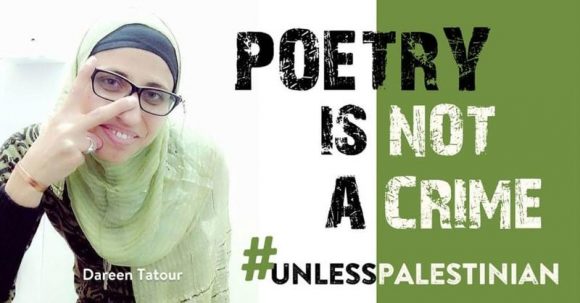March 19 and March 28 marked two critical hearings in the trial of the Palestinian poet Dareen Tatour who faces up to eight years in prison on the charges of incitement and support for terrorism.
The sessions largely focused on the testimony of two literary witnesses brought by Tatour’s defense attorneys Gaby Lasky and Nery Ramati. The defense’s overarching objectives were to establish Tatour’s inalienable right to freedom of expression, to point out the distorted police translation of Tatour’s poem, and to demonstrate anti-Arab bias in the judicial system. The contentious hearings started late and dragged into the evening as the prosecutor Alina Hardak spared no attempt to undermine the credibility of the witnesses.
The first witness to take the stand was Professor Nissim Calderon, a professor of literature and an expert in Hebrew poetry at Ben-Gurion University. His testimony established a long-standing pattern of respect for freedom of expression within the Jewish literary tradition. He argued that Jewish poets have benefited from a special legal immunity, even when they have penned fiery protest poems aimed at antagonistic regimes.
Calderon cited the examples of revered Hebrew poets who have made explicit appeals for violent resistance and who avoided legal prosecution. According to Calderon, the pioneer of Hebrew poetry, Haim Nahman Bialik wrote scorching fulminations against the pogroms of the Tsarist regime at the turn of the 20th century. “[W]ith furious cruelty,” he wrote, “we drink your blood mercilessly.” Despite explicit appeals for violence, Bialik was never prosecuted for incitement and neither was the Jewish poet Shaul Tchernichovsky who wrote similarly provocative resistance poems. Like Bialik, Tchernichovsky never suffered from repercussions from Tsar’s anti-Semitic secret police for his inflammatory poetic expression.
Professor Calderon also cited the right-wing Zionist poet, Uri Zvi Greenberg who was a co-founder of Brit HaBirionim (Alliance of Thugs), a fascist-inspired Zionist organization that violently resisted the British in mandate Palestine. Though Greenberg was a member of the Alliance and used his poetry to express support for their violent acts, he was never charged by the British for incitement. According to Calderon, this customary immunity is due to the fact that is a universal expectation and an aesthetic demand that poets express powerful emotions.
In the cross examination, the prosecutor argued that Greenberg was not arrested because the British mandate didn’t prosecute inciters. Calderon refuted this claim by using the case of his own uncle who was deported from Palestine because he supported illegal Jewish immigration. When Hardak suggested that freedom of speech is rightfully limited in times of tense political crisis, Calderon countered with the obvious fact that that the British were in the midst of fighting a war against the Nazis when Greenberg wrote his inflammatory poems, and still they didn’t arrest him.
“Should freedom of expression be given to anyone who claims to be a poet?” Hardak grilled the witness. “What if someone has only written a single poem? How do we determine that Tatour is really a poet and that her writing is actually a poem?” Hardak seemingly forgot her own argument during earlier hearings when she emphasized that Tatour is a dangerous threat to public safety precisely because of her status as an influential poet.
Professor Calderon reiterated his position that if a text is crafted as poetry then it is “entitled to all rights we give to poetry in our culture.” He proceeded to read segments of the translation of Tatour’s rhythmic and stylized poem, “Resist, my people, Resist them” in order to demonstrate its poetic qualities. Calderon then reminded the prosecutor that the legal indictment against Tatour calls the work in question “a poem.”
Calderon went on to make the case that freedom of expression is not only designated for elite literary figures, but for ordinary citizens. He cited the liturgical poem “Maoz Tzur Yeshuati” which is sung at Hanukkah celebrations around the world. “Every year,” Calderon testified, “Jews sing with their children about their enemies, calling them barking dogs, and saying that they should be slaughtered. They know that this is a song about a massacre, but it is not a massacre.”
“You’re not an objective witness,” Hardak snapped at the professor, who was quick to agree with her. “There is no such thing as an objective witness in literature. There is no court to determine the meaning and merit of literary works.”
Toward the end of the cross-examination, Hardak claimed that Calderon only relied upon texts from the distant past and hadn’t furnished any current cases. Not to be outdone, Calderon quickly offered the example of the popular singer/songwriter Ariel Zilber who sang in support of the murderer of Yitzhak Rabin. “No one prosecuted Zilber, nor should he be prosecuted. He received the defense of all those who are loyal to poetry.”
Dr. Yoni Mendel and the Art of Mistranslation
The second witness on March 19th was Dr. Yoni Mendel, an experienced literary translator and a researcher of the Arabic language within its social and cultural contexts. The general thrust of his testimony was to demonstrate that the original police translation had willfully twisted Dareen’s text “Resist, my people, Resist them” to make it seem far more extreme and violent than it was. In essence the translator had put incriminating words in Tatour’s mouth.
Mendel submitted his own translation based on his formidable professional skills and expertise. Though he mentioned a number of discrepancies in the original translation, much of his testimony and the counter interrogation concentrated about the meaning of the Arabic word “shuhada’” (plural for “shahid”) which he translated as “martyrs.”
The much-contested line reads اتبع قافلة الشهداء itb’ qāfelāt al-shuhadā’. In English this can be rendered as “follow the caravan of martyrs.” In the police translation to Hebrew the Arabic word “shuhada” was not translated, but simply replaced by the Hebraicized plural “shahidim.” Mendel explained that this detail is critical because the invented word “shahidim” provokes powerfully negative reactions for Israelis who wrongly conflate this word with terrorism. When Israelis hear the word “shahid” they think of a suicide bomber, whereas when Palestinians speaks about a shahid they are more likely to think of a sick woman who dies at an army checkpoint because she was not allowed to pass. To convey the exact meaning the translation should use the word for martyrs in Hebrew, “halalim.” Like the Arabic word “shuhada,” “halilim” implies all of those who die in wars and other disasters, including innocent victims.
Mendel supported his interpretation of Tatour’s poem by demonstrating that the poem doesn’t celebrate the purveyors of violence but rather commemorates its victims, specifically 16-year old Muhammed Abu Khdeir who was kidnapped and burned alive, baby Ali Dawabsheh who was burned with his parents in his home in Duma, and Hadeel Al-Hashlamoun who was shot at an army checkpoint in Hebron (al-Khalil).
In cross examination, Hardak asserted that Mendel’s interpretation of “shuhada” as victims must be wrong since the poet could hardly advise her readers to be murdered like them. Dr. Mendel explained that the poem’s call to “follow the caravan of martyrs” is not meant to be taken literally. The poem doesn’t ask readers to be killed and follow the martyr into their graves, but rather to commemorate the victims, to comfort the bereaved families, and to refuse to accept political solutions that deny Palestinian national and human rights.
Hardak Attempts to Tarnish Dr. Mendel’s Reputation
During the cross-examination, the aggressive prosecutor attacked Dr. Mendel’s credibility, citing two opinion articles he published in 2012 and 2014 which purportedly reveal a pro-Arab slant. She quoted the articles out of context and proceeded to attack his political views. The defense lawyers requested the judge to limit the examination to questions that directly relate to the trial and Mendel’s obvious expertise as a translator, but the judge rejected their objections and allowed the hostile counter interrogation to continue.
After almost five hours of exhausting attacks and rebuttals, the prosecutor switched strategies and presented Dr. Mendel with three videos from YouTube which ostensibly showed images of Palestinian acts of violence (the spectators in the court weren’t privy to the videos). Hardak demanded that he translate the videos to the court in order to “test” him. Mendel translated parts of the videos while the prosecutor insulted his skills and questioned his expertise. Since neither the prosecutor nor the judge speak or understand Arabic, it was difficult to see how this exercise could be designed to test the competency of the witness.
At a certain point, the prosecutor presented yet another video and asked Mendel to describe what he saw. He wearily answered that he saw yet another example of the unending violence on both sides. According to the prosecutor, Mendel thereby failed the test for not rushing to condemn Palestinian violence.
Eventually the true intention of the showing the videos became clear: the prosecutor wanted these highly prejudicial clips to be entered as evidence into the court record “through the back door” in order to impose an Israeli narrative of victimhood. Tatour’s lawyers objected to the submission of the videos, arguing that they are irrelevant to the case. The argument turned into a battle of insults and shouts, and eventually the judge postponed her decision until the next hearing.
March 28, 2017: Israeli Discrimination in the Spotlight
The defense team for Dareen Tatour has always argued that their client has been the victim of unjust discrimination at the hands of a rigged criminal justice system. From the outset of the trial, Tatour’s first lawyer Abed Fahoum contended that the Israeli criminal justice system investigates, indicts, and jails Arab citizens for incitement at a far higher rate than Jewish offenders. He had asked Judge Bambiliya to instruct the police and the state prosecutor to provide him with relevant statistical data so that he could substantiate his claim. The judge refused the request on the grounds that there was no evidence of discriminatory enforcement.
It turns out that this wasn’t true.
In June 2016, the Negev Coexistence Forum submitted a Freedom of Information Act request to receive data about this pressing legal issue. The applicants received a reply in August 2016, and two journalists John Brown and Noam Rotem wrote a detailed article (in Hebrew) on the police’s data and published it on a news site called Sikha Mekomit (Local Call).
The released data confirmed an unambiguous pattern of discrimination against Arabs. From the beginning of 2016 to the report’s release, 37 indictments were filed against Palestinian Arabs for incitement, as compared to zero for Jews. According to the Ministry of Justice, only three cases were filed against Jews for incitement in previous years. The lack of prosecution doesn’t mean that Jewish citizens weren’t involved in posting inciting hate speech on social media. According to the Berl Katznelson Foundation’s hate report, 175,000 inflammatory calls were recorded in 2016. A third of these were explicit threats including murder against Arabs, leftists, and asylum seekers.
The new attorneys for the defense Gaby Lasky and Nery Ramati found the FOIA police data. On March 28, they summoned Chief Inspector Yaniv Hami, the officer in charge of releasing it, to testify and submit the data to Judge Bambiliya. His testimony, however, turned out to be anti-climactic because all he managed to say was that, yes, he was the person who released the data. He couldn’t answer most questions, since the reports were produced by a statistician on behalf of the police, and he only mediated their transfer to the applicants. After more heated disagreement between the prosecution and the defense, the data was finally entered into the court record for further review.
The Prosecution Wins another Month of Detention for the Poet
At the end of the Inspector’s brief testimony, the defense rested its case, and it was expected that the timetable for the summaries and the verdict would be set, but the prosecutor stopped the proceedings and asked to summon a surprise witness: the very first attorney who advised Tatour on the morning of her arrest on October 11, 2015.
In the very early hours of that morning, Tatour was brought in for interrogation, but refused to answer questions before consulting a lawyer. Before her second interrogation, she was permitted to consult with attorney Hussam Maw’ed. The investigator charged her with many violations, most of which never appeared in the indictment that was later filed. At first, Tatour denied all the accusations. However in later interrogations, once the police presented Tatour with the materials they found on her computer and phone, she admitted publishing them and explained in detail her intent behind each publication.
When Tatour testified before the judge in November 2016, she was asked by the prosecutor why she had “lied” during the first interrogation. She explained that in her meeting with the lawyer Hussam Maw’ed he informed her of the serious nature of the charges and he advised her to deny everything. At this stage it was not clear to the police or to Tatour what the charges even were.
The prosecutor demanded that that attorney Hussam Maw’ed be brought as a witness in order to refute Tatour’s testimony regarding his legal advice. The defense objected sharply to summoning a lawyer to testify against his former client, explaining that this would constitute a serious breach of attorney-client privilege. Despite the reasonable objection, Judge Bambiliya approved the prosecutor’s request to summon the witness, refused to limit his testimony, and set a special session for April 27 at 12:00 noon. All this is unlikely to change the result of the trial, which is about the content of Tatour’s publications, but it prolonged the trial and added yet another month to her house detention.
Tactical Maneuver to Slant the Record
Just as it seemed that the hearing was ending, the prosecutor Alina Hardak reminded everybody that she still wanted to submit the three videos that were shown to the defense witness, Dr. Yoni Mendel, during cross-examination on March 19. What she brought as evidence was a sheet of paper with three links to the YouTube videos and a DVD disc with a text file containing the links to allow the judge to play the YouTube videos.
In one video, a Palestinian man announces his intention to carry out an attack in Tel Aviv and to be a shahid. The second video is called “the lovers of the stabbings” and erroneously displays the picture of Hadeel al-Hashlamoun, who is mentioned in Tatour’s poem, among the pictures of perpetrators of attacks (Amnesty International has called the murder of Hadeel an extra-judicial killing). The third video shows scenes of stone throwing and more violence, including a car trying to run over pedestrians. These are the videos that were used to “test” the translating ability and the bias of Dr. Mendel.
Defense attorney Ramati fiercely objected to submitting the video links on three primary grounds. First of all, he explained, whoever uploaded the films could alter their content at any time. Second, the videos were not neutral material for testing Dr. Mendel’s translation abilities; and third, the prosecution’s insistence on submitting videos could only be construed as an attempt to introduce new, unrelated content that would bias the court against the defendant, bypassing all the due procedures for presenting evidence in a criminal trial.
The prosecutor insisted on the importance of the court watching the videos yet again in order to understand the context of Dr. Mendel’s testimony. The judge agreed to this, and the discussion and debate over the videos and their content was debated for a long time. Then the issue of whether or not a person can edit the content of a Youtube video without changing the link ensued, and even the spectators in the court got involved in the discussion.
Ultimately the judge decided that, since she can’t decide the factual question of whether it is possible to edit videos after they are posted on YouTube, she will not accept the links at this stage. It was the first small victory in the Sisyphean struggle of the defense in an outrageous trial in which the prosecution has already crossed too many red lines to count. And yet, no doubt, there will be a few more red lines to be crossed before a verdict is reached this summer.
Some of this report was based on articles previously published in Hebrew by Yoav Haifawi (here and here) and Ofra Yeshua-Lyth (in HaOketz)
Allies of Dareen Tatour have set up a fundraising page for the legal defense fund for Dareen Tatour.



This trial is a farce.
Putting someone on trial for their poetry, how ridiculous can a country be. Israel never misses an opportunity to delegitimize itself.
This persecution of a little-known Palestinian poet is just one more reason to support the growing international cultural boycott against Israel.
@Mooser
I thought I told you to quit stalking me.
“once he recovers he’ll realise it.”
There’s only one Daddy to us all.